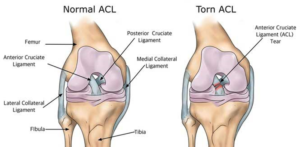Working with athletes from a range of sports I have found that the most notoriously feared injury is an ACL knee injury. Equally, when we hear one of our athletes diagnosed with an ACL injury we also feel gutted as we know the amount of time and commitment that is required to get a full recovery and return to sport as they were before.
ACL ruptures are one of the common injuries we see in our clinic. One of the first questions we usually get asked is
“How long will the recovery time be and when can I return to playing sport?”
However, with an ACL reconstruction, I find that patients are often doubly disheartened with our reply: at least 12 months for a full recovery and return to sport. We then often get asked
“Why so long?”
In order to answer that question first, it is important to understand exactly what is your ACL, what this stands for, what it does and what does the surgery involve.
Your ACL is your Anterior Cruciate Ligament. It is a ligament inside your knee joint which attaches your thigh bone (femur) to your shin bone (tibia). Its primary role is to prevent hyperextension of your knee – it stops your shin bone from sliding out in front of your thigh bone, as well as providing some rotational stability to the knee. So that being said your ACL is a very important ligament in your knee with a very big job!
The most common way to injury your ACL is with a load on your leg and twisting. It is common in many sports including rugby, netball, basketball, and football amongst others. In most cases, your knee swells up immediately and you have a significant limitation of movement. When you do put a load on your leg you have a feeling like it is going to give way unless you a very careful. Due to the magnitude of the injury, there is often damage to the inside ligament of your knee (MCL) and the cartilage on the inside (meniscus). Sometimes you get some bone bruising as the two bones smack into each other. This is all confirmed with an MRI scan.
During an ACL reconstruction, the surgeon must remove the torn pieces of your original and ruptured ACL and effectively have to build you a new one by taking a graft from either your hamstring or patellar tendon. The graft is then inserted into tunnels that have been drilled into the thigh and shin bones and attached with hardware. This is a pretty big surgery!
Why so long?
1) Graft tissue: Any graft tissue that has been used has been cut off from its original blood supply when it was removed to become the graft. So, when they place the graft in and attach it, that graft tissue now must grow a new blood supply, and this takes time! Without a blood supply, there can be no healing. The healing process begins at the bony attachment sites at 3 months post-op and works towards the center of the ACL graft over the next year. Essentially meaning there is no healing of the graft at all until 3 months which is why at 4-16 weeks post-op your surgeon and physio are very careful with your rehab because this is the time in which re-rupture is most likely!
2) Muscle weakness: After any surgery, due to pain and inactivity, patients suffer from muscle inhibition and wasting. Therefore, as your muscle decreases in size and is not being used as much it also gets weaker. So, once you are allowed to start rehab you have to rebuild the strength and control in your knee, and this can take months – particularly to regain sport-specific strength.
3) Loss of proprioception: Proprioception is your bodies ability to know where your joints and limbs are in space, e.g. your balance. When you get damage to a joint the fibers that detect this information also get damaged. These then need to heal and learn how to do their job again. This is another step to your recovery that is essential for a return to sport! It is important that your brain knows where your knee is and what it is doing otherwise you just might miss that game-winning goal.
The short answer is – your body has a lot of areas to recover and rehab and therefore needs quite a bit of time to do that. But the good thing is if you follow your physio and surgeon’s advice and take your time with recovery you will be better and stronger for it. Plus you will significantly decrease your chance of reinjury.
For more information on ACL injuries click here.
To book an appointment with us to start or pre-habilitation, post-op rehabilitation or rehabilitation many years after surgery or injury, call us now on 021438825 and we will get you started on your recovery today.

